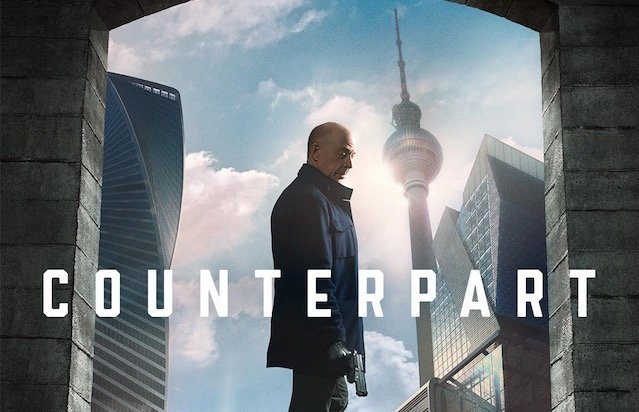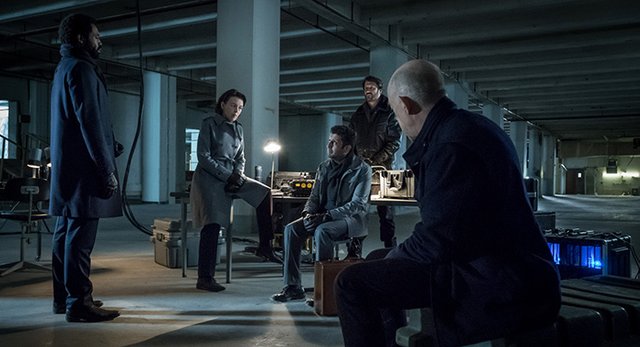
The start of 'Counterpart' is a real treat for devotees of realistic science fiction, politicized, with droplets of dystopia or, perhaps, alternative universes that do not need to be shrill to tell exciting stories. It has an air to the mythical 'The process' of Kafka, which although is not science fiction, it is an inescapable reference for authors like Philip K. Dick or for films like 'Brazil'.
In these first bars, we see the Oscar-winning JK Simmons, charismatic even when embodying a clerk, subjected to strict and dehumanizing security controls, waiting in long queues and inspections with other gray officials. In the end, he enters -like his companions- in an individual cabin, where a mirror separates him from another man similar to him, with whom he exchanges, separated by a crystal, codes, words, phrases, apparently insane and without global sense.
There are no strictly fantastic elements, but the spectator familiar with certain genre resources will know how to detect a fantastic air. Not explicit, as in the aforementioned 'The process', but there is something in the atmosphere. Soon he will have the opportunity to corroborate that he was not mistaken: the elements of science fiction are unleashed, calling this time explicitly to the most memorable moments of 'Fringe', when we discovered that those two office workers separated by a crystal belong to parallel realities.
Simmons plays Howard Silk, who discovers that there is a copy of himself in an agency that was born because of experiments in East Germany in the sixties. The universe (or Berlin) unfolded, and now there are people who are moving from one dimension to another committing crime - involving him and his wife, six weeks in a coma after an accident. He will have no choice but to collaborate with the Silk of the other dimension, so similar to him as different in many ways so that this complex universe does not collapse.
This is just the starting point: in the three episodes that Starz has broadcast for the moment, the plot begins to fork in different characters that unfold. The pace of the series is closer to an intrigue with spies of the seventies (although here the interdimensional functionary is revealed as much more ruthless than an agent with a license to kill), with gradual revelations and a very measured rhythm. For example, in these first three episodes, we barely have time to peek into one of the two unfolded worlds.
Because the world in which the first, timid and timid Silk lives is ours, but not entirely. It is rather an alternative reality to ours, in which this unfolding of realities has prevented the world from developing to reach the point where we currently live: from a first glance, the scenario appears to be Berlin, in full Cold War - in fact, the metaphor of two dimensions as a Steel Curtain is obvious - but there are constant elements that remind us that we are not in the present. In a present different from ours.
Dual nature

'Counterpart' plays a science fiction card less shrill than 'Altered Carbon', to give a recent example of television science fiction circulating in a diametrically opposite way. Far from resorting to anticipation and caricature to predict our future vices, 'Counterpart' uses an almost metaphysical trope of gender (the unfolding of realities) to talk about ourselves, about the multiple aspects of our personality that sometimes make us different people according to the day.
Much of the merit of this fascinating idea is carried by the interpreters of a story centered on the characters. Above all, Olivia Williams as Emily Burton, the woman of Silk, polyhedral and full of contradictory nuances, and of course, Simmons himself. Only by changing the way you walk or the tone of your voice you become completely different but at the same time with a past and a common essence: just what you need a history of unfolded realities.
The result is a serene and adult adventure, which relies on a creation of progressive suspense and that knows how to solve puzzles while raising a new one. In its first three episodes, 'Counterpart' is, possibly, the best television science-fiction series of the moment, and it does not achieve it with fireworks or plot capers, but going back to the sober style of the thriller of espionage of the sixties. Quite a surprise that we hope to keep the guy in the ten episodes that make up his first season.